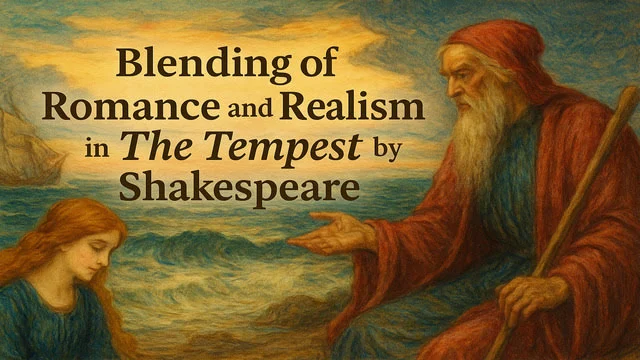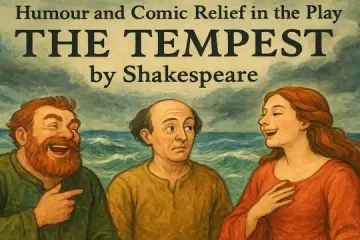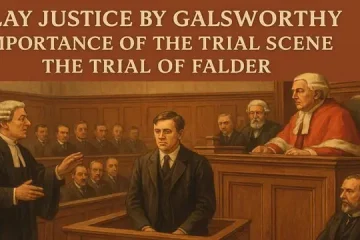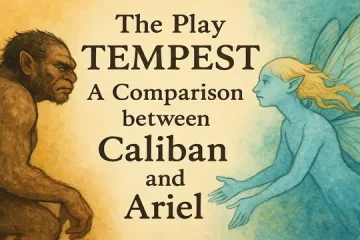“The Tempest”: As a Romance:
Introduction:
“The Tempest” is a romance. There is a blending of romance and realism in the Tempest. It is a separate category of plays. It differs from romantic comedies like “As You Like It” or “A Mid Summer Night’s Dream”. Scholars observe that “The Tempest” is one of the most imaginative, most original, and most varied of Shakespeare’s romantic dramas. In it “the wild and the wonderful, the pathetic and the sublime are artfully and gracefully combined with the sportive sallies of a playful imagination.” In it Shakespeare has “made the supernatural natural, and the wonderful ordinary.” In short he has “imagined new.”
A Simple Plot:
The play has a very simple plot. The action is simple and develops with the help of the supernatural under control of Prospero. Much of the action is in the background of the play. It deals with the treachery of Prospero’s brother. It is interesting to note that the background action covers a long period of many years while the staged action is limited to a few hours.
Prospero’s Misfortune: A Victim of Treachery:
Prospero tells Miranda the story of his misfortune. He tells how his brother Antonio- became dishonest. Though he loved and to him handed over the management of his state. Being busy all the time in his study, the charge of the government Prospero left upon my brother. With the passing of time Prospero grew stranger to his state being over – busy in secret studies of magic.
Antonio created a strange situation that the creatures that were loyal to Prospero were changed. Antonio, now, was the prince and Prospero fell into background. Antonio conspired with the King of Naples, by surrendering the dukedom, yet undefeated. King of Naples was always an enemy to him supported his dishonest brother. Antonio, according to the wicked plan raised an army.
And one midnight Antonio opened the gates of Milan; and, in the dead of darkness, banished him and the crying child that is Miranda. They hurried them in a boat; took them some leagues to sea, where they had prepared a rotten ship having not even sail, and mast. There they left them, to cry to the roaring sea, to sigh to the winds. Prospero believes that it was a miracle done by Providence divine.
Some food they had with some fresh water that was given by a noble Neapolitan, Gonzalo. Out of his charity, He being then appointed controller of this plan, gave them, with rich garments, linens, stuffs, and other necessary things. It was his gentleness, that knowing he loved his books more than the dukedom; he gave him from his own library volumes of books on magic.
“By Providence divine.
Some food we had and some fresh water that
A noble Neapolitan, Gonzalo,
Out of his charity, who being then appointed
Master of this design, did give us, with
Rich garments, linens, stuffs, and necessaries,
Which since have steaded much; so, of his gentleness,
Knowing I lov’d my books, he furnish’d me
From mine own library with volumes that
I prize above my dukedom.
Here in this island they arrived.”
Prospero’s Struggle on the Island:
Prospero decides to take revenge from the wicked brother. For it Prospero needs power. For which he liberates Ariel from the prison of the foul witch Sycorax, who with age and envy had grown double. Prospero tells that this blue – eyed witch was brought on that island with a child, and here she was left by the sailors. Ariel as he reported himself was then her servant and made her angry. She arrested him, by help of her more powerful ministers, into rift of a cloven pine.
The son that she delivered here was deprived of human shape. Caliban, her son is dull creature. Caliban is now in his service. Prospero claims that Caliban was uncivilized. Prospero has used him with human care just to civilize him. He kept Caliban in his own cell. But Caliban took its undue advantage and tried to violate the honour of Miranda, his daughter.
It forced Prospero to be strict with Caliban. All the feelings of pity for him disappeared and Prospero reduced him to be a slave fit to perform mean duties like arranging for fire by bringing wood. If Caliban ignores his duties he is punished severely.
“But as ‘tis,
We cannot miss him: he does make our fire,
Fetch in our wood, and serves in offices
That profits us.”
Long – awaited Opportunity:
Prospero tells Miranda the reason for raising this sea – storm. Prospero asks her to know that by accident and strange Fortune, his enemies are brought to this shore. Being a great magician Prospero has potent spirits to serve him. He is the master of this island. Antonio is his brother and the usurping Duke of Milan.
In fact it is because of Antonio that the tempest is raised for Prospero wants to teach a lesson to his wicked brother who, just to get the crown, betrayed his godlike elder brother and attempted at killing him along with his daughter Miranda.
Prospero: Controller of Supernatural Powers:
Prospero is strong enough to control supernatural powers. Ariel is obedient to him. It runs through air and remains invisible or in the shape directed by Prospero to serve him. Graves at his command have waked their sleepers, opened, and let them wander forth, by his so strong magic.
It suggests Shakespeare’s historical plays. But this rough magic he here gives up and, now he has requirement of some heavenly music – which even now he does to work his end upon their senses that this airy charm is for. He decides to break his magic- staff, and bury it certain fathoms deep in the earth, and deeper than did ever plummet sound he will drown his book.
“Graves at my command
Have wak’d their sleepers, op’d, and let ‘em forth,
By my so potent art. But this rough magic
I here abjure; and , when I have requir’d
Some heavenly music – which even now I do
To work mine end upon their senses that
This airy charm is for, I’ll break my staff,
Bury it certain fathoms in the earth,
And deeper than did ever plummet sound
I’ll drown my book.”
His resolution to give up them shows that he is free from the temptation of keeping them with him forever. It is the quality of real: controller.
Prospero’s Supreme Will:
When he discovers that his enemies are penitent. He decides to forgive them. He presents a show of fairies before Ferdinand and decides to make all powers free for the work is over. He declares that their show is now over. These actors, as he foretold him, were all spirits, and they are melted into air, into thin air; and, like a dream the cloud – capped towers, the high palaces, the solemn temples, the great world itself, as well as all which it has shall melt and, like this show that has now disappeared does not leave even a mark behind it.
Prospero claims that all human beings are made of like dreams and their little life is rounded with a sleep. Nobody knows where he was before his birth and whereto he would go after death. His own life is no better than a dream.
As a dream is remembered hardly for a day or two, the dead too are forgotten after a year or two. He is upset. He knows that it is his weakness. His old brain is troubled. But they should not feel disturbed with his weakness. If they allow he will like to retire into his cave and there take rest. Before that he will walk a turn or two to calm down his beating mind.
Prospero’s Faith in Virtue:
Ariel reports how Antonio and other victims of the tempest have been suffering bitterly. But chiefly he is sorry whom Prospero called “the good old lord, Gonzalo”. His tears run down his beard, like winter’s drops from thatch of reeds. His charm so strongly works on them that if he now beholds them his affections would become soft. Prospero asks if Ariel thinks so. Ariel claims that his heart would melt if he were human. Prospero admits that his heart shall. Ariel is but air yet feels a touch, a feeling of their sorrow. Their sorrow shall move him also for he is one of their kinds.
He feels all as strongly the passion as they. Though with their high wrongs he is struck greatly, yet with his nobler reason against his fury he takes part; for the greater action is in virtue than in revenge. Those who did wrong with him are repentant; he will not extend the sole action of his purpose any more. He asks Ariel to go and release them. He will break his charms, he will give back their senses, and they shall be as they were. Ariel promises to bring them.
In this way, Shakespeare has depicted the supremacy of human will in Prospero.




